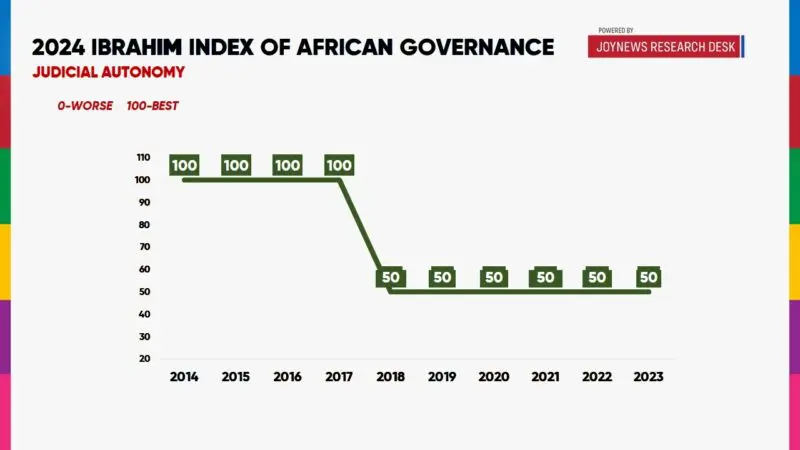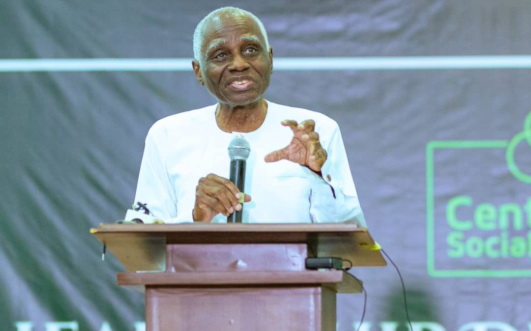Renowned legal practitioner Tsatsu Tsikata is worried about what he describes as a worrying decline in public confidence in Ghana’s judiciary.
According to him, this situation has the propensity to trigger dire implications for the country’s democratic framework.
His comments come amid findings from the 2024 Mo Ibrahim Index on African Governance, which reported a stark drop in Ghana’s judicial autonomy from 100% to 50% over the past seven years, reflecting a significant shift in perceived judicial independence.
Speaking on Accra-based GHOne TV, Mr Tsikata explained the broader impact of this perception on the legal profession and the overall adjudication process.
“If people lose confidence in the judiciary, it is also a loss of confidence in the legal profession,” he noted.
“The judiciary is made up of individuals who have risen through the ranks of the legal profession, and when confidence in the judiciary wanes, it directly impacts the entire process of adjudication, which is what lawyers practice in the court.”

Tsatsu Tsikata highlighted a troubling public perception that aligns the judiciary’s decisions with the ruling New Patriotic Party (NPP), warning of the potential consequences.
“There’s a perception that the judiciary is acting in favour of the NPP,” he said, noting that this perception is becoming a common talking point among citizens.
“Ordinary citizens jokingly refer to the judiciary as a ‘unanimous football club,’ deciding cases in favour of one side. This creates a dangerous precedent where people lose faith in the judicial process altogether.”
He cautioned that allowing such perceptions to grow unchecked could erode the credibility of the judicial system, impacting both democracy and the administration of justice in Ghana.
During a recent youth engagement, the Vice President and New Patriotic Party’s presidential candidate, Dr. Mahamudu Bawumia highlighted that Ghana ranks as the seventh-best-governed country in Africa, according to the Mo Ibrahim Foundation.
- Read also: Ghana’s judicial impartiality index drops by 30% between 2017 and 2023 – Mo Ibrahim Foundation
Yet a closer look at the data from the Mo Ibrahim Foundation revealed the troubling trend in judicial independence—a key pillar of democratic governance.
The index shows that between 2014 and 2017, Ghana’s judiciary maintained a score of 100% autonomy. Starting in 2018, however, this rating dropped by half to 50%, where it has remained through 2023.
Judicial autonomy, as defined by the index, reflects the judiciary’s ability to interpret laws independently, free from political pressure or interference by other government branches.
The report’s findings come amid criticism from civil society groups, who point to the appointment of political actors to the judiciary and the remand of protesters as signs of potential influence on the courts.
The implications of the score drop are significant, suggesting a need for stronger safeguards around judicial independence.
Ensuring an impartial judiciary will be crucial to reinforcing public trust and is likely to become a focal issue in the run-up to the upcoming elections.
Latest Stories
-
5.3% Q1 GDP growth a good sign – Mahama assures stability and prosperity for all
22 minutes -
Zoomlion contract will not be renewed, Sweepers’ fees to increase—President Mahama
29 minutes -
Happy FM, Asaase Radio, Wontumi FM and 59 others shut down for ‘regulatory breaches’
51 minutes -
Elie Kamano’s song amplifies Pan-African Reparations call with music video
54 minutes -
Yango Ghana celebrates partner drivers to mark International Drivers Day 2025
1 hour -
Global tariff disputes could benefit Ghana – Michael Kottoh
1 hour -
We waste human resource and over-politicise the system – Prof Adu-Gyamfi
2 hours -
CHRAJ joins global effort to commemorate 2025 World Day against child labour
2 hours -
Military reshuffle will boost morale – Defence Minister
2 hours -
Ghana lost its direction after independence – Prof Yaw Adu-Gyamfi
2 hours -
Technology brand, TECNO becomes global partner of the TotalEnergies CAF AFCON 2025 & 2027
2 hours -
MTN Ghana begins 21 Days of Y’ello Care with focus on digitalisation in rural communities
2 hours -
Professor Adu-Gyamfi backs constitutional reforms, calls for return of power to the people
2 hours -
Ghana’s health system is ill-structured and lacks discipline – Prof Adu-Gyamfi
2 hours -
We let ourselves down – Antwi reflects on Kotoko’s title miss
2 hours

